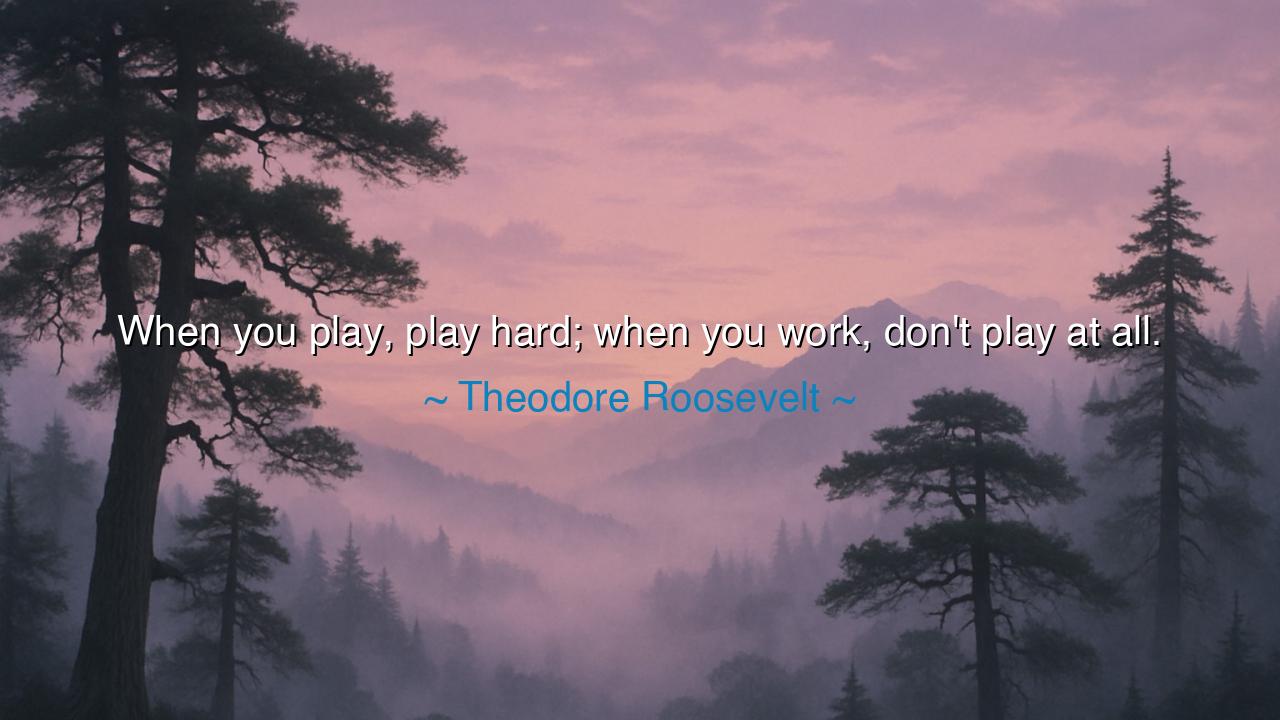
When you play, play hard; when you work, don't play at all.






The words of Theodore Roosevelt thunder with the vigor of a man who lived life with unrelenting intensity: “When you play, play hard; when you work, don’t play at all.” In these words, he lays before us the creed of discipline and joy, each given its proper place. He declares that life is not to be lived half-heartedly. When leisure calls, embrace it with all the laughter and vigor you can muster. But when duty summons, banish distraction and bend your whole being to the task at hand. To Roosevelt, both play and work are sacred, but they must never be mingled.
Roosevelt himself was a man of contradictions made whole by this very philosophy. He loved the outdoors, hunting, boxing, and horseback riding—his play was fierce and exuberant. Yet when it came to work, whether in the halls of government, in his writing, or on the battlefield, he was a titan of focus. His quote is not idle talk, but the lived wisdom of one who understood that the heart must not be divided. For a divided heart leads to mediocrity, but a devoted one—whether to labor or leisure—leads to greatness and renewal.
History gives us an image of this truth in the Roman general Scipio Africanus. In battle, he was relentless, never allowing distraction to dull his edge. But after victory, he celebrated with equal intensity, feasting and rejoicing with his soldiers. His enemies feared his discipline, and his men loved his joy. Like Roosevelt, Scipio showed that life is not about denying either labor or pleasure, but about giving each its due in its season.
The wisdom here is also a warning. To mix work with idleness is to dishonor both. The man who dallies at his labor cheats himself of success, just as the man who works half-heartedly during leisure cheats himself of rest. Roosevelt teaches us that wholeness comes not from constant toil nor constant play, but from rhythm—labor done with full focus, and rest embraced with full joy. This rhythm strengthens the spirit, like the beating of a steady drum that marches one through life with purpose.
And so, O seeker, the lesson is clear: when you face your duty, face it with iron resolve. Do not toy with your time, for time is the coin of life, and once spent, it cannot be reclaimed. Yet do not deny yourself the renewal of play. When the day’s burdens are laid down, let laughter, friendship, and recreation fill your heart. For both are necessary—the strength of work and the refreshment of play—and only in balance can a life be lived fully.
Practical wisdom follows: when you work, cast aside distractions. Guard your hours like a warrior guards his shield. Enter into your tasks with full presence, as though the world depended upon your effort. But when you play, do so with abandon. Put away guilt, put aside hesitation, and let your spirit breathe. In this balance, you will find not only productivity, but joy; not only discipline, but renewal.
So let Roosevelt’s words resound across the ages: “When you play, play hard; when you work, don’t play at all.” For in them is the secret of a life that is both fruitful and joyful. Work without distraction, rest without guilt—this is the way of strength, the way of clarity, the way of greatness.






Ttuanbigbird
Roosevelt’s quote seems like a reminder to live with purpose and focus. How often do we mix the two—work and play—when they should be distinct? It’s easy to be distracted, especially in a fast-paced world, but this quote makes me think: Are we really playing when we’re not fully engaged? Similarly, are we truly working if we’re distracted by leisure? Could we benefit from applying this focus in our daily lives, both at work and at play?
WHWill Hunting
This quote makes me reflect on my own habits. How often do I find myself playing at work or working during playtime? It seems that Roosevelt is encouraging us to be all-in, whether in work or play. If we treated work with the same intensity we give to leisure, would we be more productive? And conversely, if we let go of work-related thoughts while playing, would our downtime be more restorative?
NDKim Ngoc Duong
I love the simplicity of this quote from Roosevelt. It reminds me that life isn’t about balancing everything at once—it’s about being present and putting in the effort when it counts. There’s something powerful about fully immersing yourself in both play and work, without mixing the two. How often do we try to blend play with work, thinking we can do both at the same time? Wouldn’t our lives be more fulfilling if we gave our full attention to what we’re doing, one thing at a time?
TTThanh Tam
Roosevelt’s words seem to suggest that if we’re going to do something, we should do it with full commitment. It’s a powerful reminder, especially when it comes to working. I sometimes find myself 'playing' at work, but this quote challenges that approach. Do we give our best effort when it matters, or do we allow distractions to take over? Could this mindset of ‘no play while working’ help us achieve more, or does it add unnecessary pressure?
HThuy thanh
I find this quote by Roosevelt refreshing in its simplicity. It’s a call for balance, but more importantly, for intensity. When you're working, you're not just going through the motions—you’re focused, giving everything to that task. Similarly, when you’re playing, you’re not just killing time, you're enjoying yourself. How often do we forget this balance and allow ourselves to be distracted or half-hearted in both play and work? What would happen if we truly embraced this mindset?